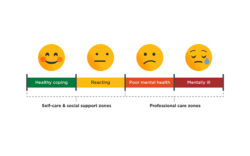
How to build resilience and understand mental health
There are endless articles on noticing the signs of depression or anxiety. There’s no doubt that mental health awareness in this form is very important. After all, 1 in 7 Australians will experience depression and 1 in 4 will experience anxiety in their lifetimes.
But life can be pretty darn awful sometimes without us ever developing a mental illness. What should we be doing when things are tough, but we don’t have signs of diagnosable mental illness?
That’s where resilience comes in, but first, let’s consider how poor mental health and mental illness are different on the spectrum of mental health.
Mental health exists on a spectrum from positive mental health through to mental illness on the far end. Most people bounce between these mental health states throughout their lives. This can be caused by many things and is very normal. But living life with extended periods of poor mental health increases your chances of developing mental illness.
 Image: Bupa Australia
Image: Bupa Australia
Resilience has a role to play in what gets us through difficult times without developing mental illness. Of course there’s a range of other factors too, including genetics. However, resilience is a great skill to have, because you can’t always prevent stressful situations, but you can strengthen your ability to deal with them.
What is resilience?
Resilience is the ability to ‘bounce back’ from difficult or challenging life experiences.
Resilience is something we exercise all the time in managing the regular ups and downs of everyday stresses. But when something particularly stressful or devastating happens, our normal levels of resilience truly get put to the test. While resilience helps us move through difficult times, it doesn’t mean we don’t experience hurt or distress in the meantime.
Upcoming assignments or exams, dealing with limited finances, ending relationships and living away from home are some regular stresses we might experience while at uni. Building resilience can help us manage these things without staying in the ‘poor mental health’ category for too long. While building resilience can help, that’s not to say it will mean you never develop a mental illness. Genetic predisposition, particularly traumatic events and other factors play into mental illness.
HOW TO BUILD RESILIENCE
Build positive relationships
Your support network is the #1 ticket to resilience. This might be your family, friends or other people in your life. Some of us have better support networks than others, but there are many opportunities around us to make some human connection. This might be a volunteering organisation or church group you’re a member of. Take some time to consider the relationships that have served you and those that haven’t. Can you work on making them more positive? For more information on improving your personal relationships, see here.
The important thing here is to ask for and accept the help of others. Life wasn’t meant to be walked alone.
Take care of yourself
No one can power on forever without some self-care and love. What self-care looks like is different for everyone. Find the activities that you lose time in and really enjoy. Make a plan to do them more often. It doesn’t matter what it is, as long as it makes you feel happy. Paint, draw, sing, exercise, cook, tinker, read, practice mindfulness… Pay attention to your own feelings and give yourself the time and attention to work through how you feel. Be kinder and more compassionate to yourself. If you spoke to others the way you speak to yourself, would you have any friends?
You’ll be more resilient to everyday stresses if you introduce some self-care into your schedule. And when life presents more troublesome obstacles, you’ll have some routine good habits to fall back on.
Avoid catastrophising
Blowing things out of proportion is all too common. If you pay attention to your thoughts, you might catch yourself doing it. When Sally took a day to text you back, did you imagine an entire situation in which Sally hates you? This is where you can intervene in your own thoughts and keep things in perspective. There are many reasons why Sally might have responded slowly and they’re probably not to do with you. For more tips on stopping catastrophisation, see here. Once you start training your brain this way, you’ll be able to keep things in perspective more often.
Recognise your struggle as valid
While it’s good to keep things in perspective, stop shaming yourself for your struggles. There’s no good in telling yourself that other people have it worse. Each struggle is different and relative to many other factors. And how this particular struggle feels might be much worse than something you dealt with a few years ago. Each and every person faces difficulties of varying magnitude, but they are all valid.
Think about all the times you’ve struggled before
Put things into perspective and think about the toughest situations you have faced before. What were they? How did you cope? Once you remind yourself of these things, you’ll realise that you’re probably pretty resilient already. You’ve got this. And remembering what worked in the past will help you with our next point.
Don’t wait for the situation to fix itself
Think about what you need to do to aid or resolve the situation. Change your mindset from ‘When will I be released from this?’ to ‘What am I going to do about this?’. Take decisive action to make the situation go away, or to help yourself cope with it.
Is it making some tedious phone calls to Centrelink or booking an appointment with your local Community Legal Centre? Is it to front up and have that honest conversation with a friend? Is it time to seek the help of a mental health professional or GP?
Maybe it involves a more self-guided approach like making a plan to bring more self-care into your life, or to reign in your spending. Whatever it is, make a plan to tackle the problem or to gently support yourself through the circumstances you can’t avoid.
When to seek help
Now after all this, you might be wondering when it is the right time to seek professional assistance for your mental health. There are times in which resilience can only get you so far. To an extent, this is up to you. Many people see a psychologist or counsellor as a form of self-care, to vent and move on, or to amplify their mental clarity and performance. If you’ve got the opportunity to see a psychologist at low or no-cost, this might be an option for you.
It is time to seek the help of a mental health professional if:
- your own coping skills and at-home self-care techniques aren’t working,
- your symptoms are causing significant distress in your life and affecting everyday functioning,
- the issue is negatively affecting relationships at uni, work or in your personal life, and/or
- you’ve been overusing or abusing a substance (or a person) to deal with your symptoms.
Every single one of us has encountered difficulties before and will encounter them again. While many of us will develop a mental illness in our lifetimes, many of us also spend a large portion of our lives without one. But that doesn’t mean it won’t be difficult to cope sometimes. To a certain degree, these techniques for building resilience might help you tackle the next problem that comes your way. There is often a lot we can do to help our own situation. We must first recognise our own strengths and weaknesses, come to grips with the reality of the situation, and actively seek out solutions or bolster our self-care. However, if you do want or need to seek professional help, there is absolutely no shame in it. We are all on our own journeys, however, we need not be alone in them.
“The oak fought the wind and was broken, the willow bent when it must and survived.”
― Robert Jordan, The Fires of Heaven
UNE students can access free counselling through UNE Student Counselling and Psychological Services (CAPS). They are fully qualified and registered psychologists, offering on-campus appointments and phone/video chat sessions for online students. The service is confidential and free for UNE students.
You can contact them Monday- Friday, 9am-4 pm, on (02) 6773 2897.
For more urgent assistance, UNE offers After Hours Support on weekdays from 4.00pm to 9.00am AEST, weekends and public holidays. Phone 1300 661 927 or text 0488 884 169. Alternatively, you can contact Lifeline on 13 11 14.
If there have been difficult events in your personal life or if your mental health is causing problems for your study, Advocacy & Welfare can help you request assignment extensions, special extensions of time, or apply for a remission of fees.
Contact us at advocacy@une.edu.au or (02) 6773 3116.
You’re never alone at UNE.


